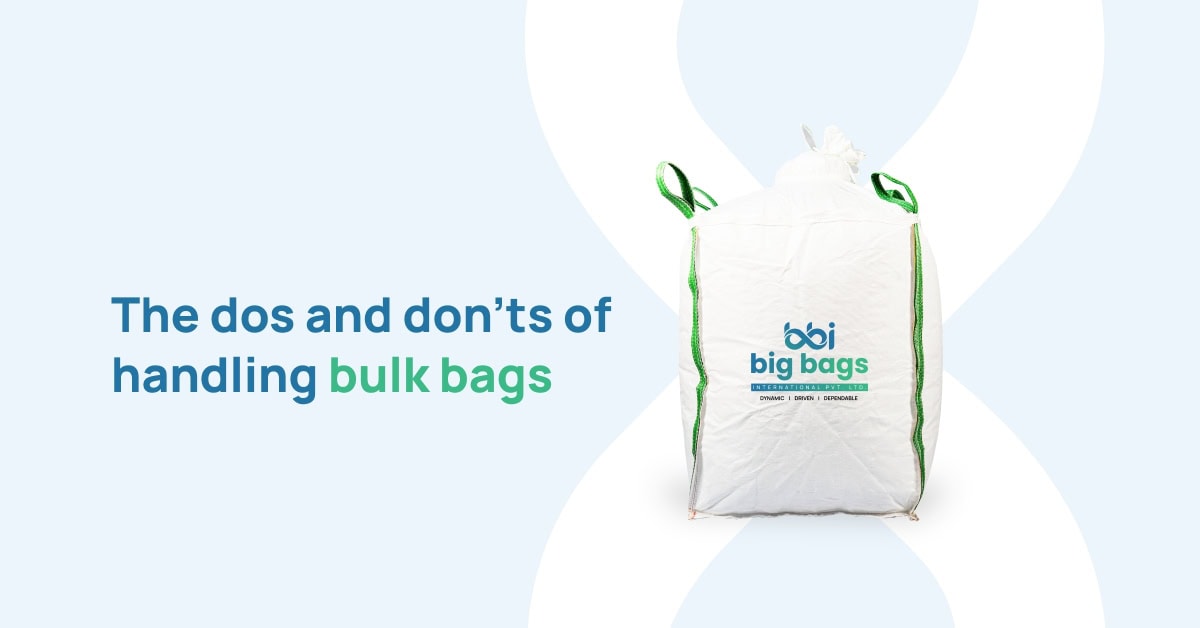The Dos and Don’ts of Handling Bulk Bags

However, to ensure safety and prevent damage to bulk bags and their contents, users need to handle them correctly. Keep reading as we discuss the dos and don’ts of using bulk bags to help you handle them safely.
Do’s of Handling Bulk Bags
By following these guidelines, you can help ensure that your bulk bags are handled safely and that their contents are protected during storage and transportation. Here’s a list of dos to follow, as recommended by bulk bag manufacturers.
It’s crucial to consult with your bulk bag manufacturer or supplier when selecting FIBCs or bulk bags to ensure that you are choosing the one best suited for the job. They can advise you on the capacity, size, and material of the best FIBC or bulk bag for your needs.
2. Read the Instructions Label
We suggest reading the bulk bag’s instruction label carefully before use. The maximum weight capacity, handling guidelines, and safety precautions are all listed on this label.
3. Inspect Reusable FIBC
Check the FIBCs or bulk bags for reusability before filling them if you plan to reuse them. Verify that the FIBCs or bulk bags don’t have any flaws or damages that could cause them to break or leak during handling.
Make sure the discharge port is closed before filling the FIBCs or bulk bags. This will prevent any contents from leaking during transportation.
Ensure that the FIBCs or bulk bags are stable and not at risk of toppling over after they’ve been filled.
To guarantee that the contents of the FIBCs or bulk bags are safe and secure during transportation, properly close the top inlet.
Ensure the lifting equipment you use to handle the bulk bags has enough strength to support the suspended load.
The distance between the forklift arms must be adjusted to the appropriate width for the FIBCs or bulk bags being handled to ensure the safe handling of the container.
9. Tilt Mast
To help balance the load and keep it from toppling over, tilt the forklift truck’s mast backwards at a suitable angle.
Ensure that any crane hooks, bars, or forklift arms used for lifting are the correct size and have a minimum radius of 5 mm or at least the same thickness as the sling belt or rope suspensions.
Take necessary precautions to control dust during transportation, as it can be hazardous to both workers and the environment.
Static electricity hazards could lead to a fire, so ensure you’ve taken the appropriate safety precautions to avoid them.
Protect the FIBCs from rain and direct sunlight, which could damage the containers or their contents.
During transportation, ensure that the FIBC or bulk bag is adequately secured to prevent it from shifting or spilling its contents.
Don’ts of Handling Bulk Bags
To ensure the safe handling of your bulk bags and protect their contents during storage and transportation, here are a few don’ts to keep in mind:
Choosing the best FIBCs or bulk bags for the job requires considering the nature and weight of the material to be stored, as well as consulting the manufacturer or supplier.
2. Don’t Exceed the SWL (Safe Working Load)
The SWL or maximum weight the FIBCs or bulk bags are designed to support, should never be exceeded to protect the container and prevent injuries.
To maintain stability and prevent damage, it’s crucial to fill the FIBCs or bulk bags evenly.
Abrupt stops or starts can damage the FIBCs or bulk bags and their contents. This also puts workers at risk.
Snatch lifts and jerks can damage the container and its contents, as well as put workers at risk.
6. Don’t Allow Personnel Under Suspended FIBCs
To prevent potential harm in case of a sudden drop, personnel should not stand or work beneath suspended containers.
This poses a risk to personnel and can cause damage to the FIBCs or bulk bags and their contents.
Tilting the forklift’s mast forward can cause the load to shift, posing a risk to personnel and damaging the FIBCs or bulk bags and their contents.
It’s crucial to release the load on the lifting devices before removing the forklift arms to prevent damaging the FIBCs or bulk bags and injuring personnel.
To prevent collapse and damage to the containers or materials, ensure the containers are stacked securely.
If using FIBCs or bulk bags in extreme conditions, such as high temperatures or harsh environments, check with the manufacturer or supplier to ensure they are suitable.
Single-trip FIBCs are designed for one-time use only and should not be reused.
Heavy-duty reusable FIBCs are built to specific specifications, so they shouldn’t be replaced unless the new containers meet those specifications.
Dragging FIBCs or bulk bags over uneven surfaces can damage and compromise the container’s stability and strength.
Also Read : Food-Grade FIBC Bags: A Perfect Packaging Solution
Safely Handle Your Bulk Bags
By following these guidelines, you can protect and maintain your FIBCs, allowing them to last longer. Stick to these dos and don’ts to reap the benefits of versatile and cost-effective FIBC solutions.
If you have any questions or concerns about the safe handling of bulk bags, be sure to check out Big Bags International, the best bulk bag manufacturer in India, for qualified and professional guidance.
